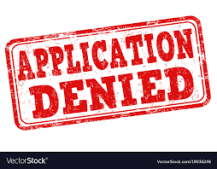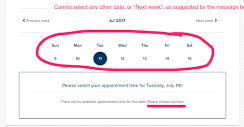 A new study from the CATO Institute, a think tank in Washington DC, shows that the denials are up about 37% under the new administration. The CATO institute did NOT include naturalization applications, TPS and Deferred Action for Childhood Arrivals applications in its statistics, as these are programs under fire right now by the administration.
A new study from the CATO Institute, a think tank in Washington DC, shows that the denials are up about 37% under the new administration. The CATO institute did NOT include naturalization applications, TPS and Deferred Action for Childhood Arrivals applications in its statistics, as these are programs under fire right now by the administration.
Looking at some individual applications:
– I-129 denials went up from 16.8 percent to 22.6 percent
– Not surprisingly because of the previously discussed rule to deny I-131s if foreigners travel on their H-1B before it is approved, I-131 denials went up from 7.2% to 18.1%
– I-765 employment authorization denials increased from 6% to 9.6%
– Employment-based I-485s saw an increase in denials from 5.9% to 7.9%
– Fiance petitions were rejected at a more than a 50% higher rate, rising from a 13.6% denial rate to a 21% denial rate
To see the full article, please click here.
Personally, we have seen USCIS adjudicates cases in a more strict manner, which is tied to their changing how they interpret regulations, especially in the H-1B context. They are more stringent regarding what a specialty occupation is, over what constitutes the correct employer-employee relationship, as well as other critical issues in the H-1B context. While our office has not seen a rise in the denial rates of applications we submit, we definitely do see the increased scrutiny that USCIS is paying to particular applications. It certainly pays to be extra careful in drafting and filing these applications to ensure a smooth process with USCIS and to avoid getting caught up in their increased scrutiny.
Please remember, as always, this blog does not offer legal advice. If you need legal advice, consult with a lawyer instead of a blog. Thank you.



 USCIS announced that it is phasing out InfoPass appointments at local offices (self-scheduled appointments) except on a limited basis. Basically they will allow appointments on an emergency basis and to deliver documents to the local office only. USCIS stated that their research showed that for the vast majority of people who make appointments at local offices, the questions they asked could be answered using the on-line resources at USCIS.com or calling the 1-800 number. In addition to the limited on-line appointments, if you call the 1-800 number and they determine that an appointment at the local office is needed, they will schedule it directly for you. There are certainly pluses and minuses to this new policy.
USCIS announced that it is phasing out InfoPass appointments at local offices (self-scheduled appointments) except on a limited basis. Basically they will allow appointments on an emergency basis and to deliver documents to the local office only. USCIS stated that their research showed that for the vast majority of people who make appointments at local offices, the questions they asked could be answered using the on-line resources at USCIS.com or calling the 1-800 number. In addition to the limited on-line appointments, if you call the 1-800 number and they determine that an appointment at the local office is needed, they will schedule it directly for you. There are certainly pluses and minuses to this new policy. Charlie Oppenheim updated his predictions on the movement of immigrant visa numbers for the foreseeable future. I will detail some of the highlights below, however, please do remember that these are just predictions from Mr. Oppenheim and they can change depending on what the actual demand in any given category actually materializes.
Charlie Oppenheim updated his predictions on the movement of immigrant visa numbers for the foreseeable future. I will detail some of the highlights below, however, please do remember that these are just predictions from Mr. Oppenheim and they can change depending on what the actual demand in any given category actually materializes. Yesterday, USCIS announced that they would be suspending premium processing for 2019 Cap-subject applications until September 10, 2018. This means you can only file cap-subject applications via regular processing. Those applications that are cap-exempt, including those filed by universities and those for extensions of H-1B status, can continue to use premium processing. Below is a section of the press release from USCIS:
Yesterday, USCIS announced that they would be suspending premium processing for 2019 Cap-subject applications until September 10, 2018. This means you can only file cap-subject applications via regular processing. Those applications that are cap-exempt, including those filed by universities and those for extensions of H-1B status, can continue to use premium processing. Below is a section of the press release from USCIS: USCIS Now Accepting Credit Cards for Most Filings
USCIS Now Accepting Credit Cards for Most Filings In the last year, USCIS has certainly increased its scrutiny on all cases, especially on H-1B cases.One tact that USICS has taken is to insist that, if an employer has used a Level 1 wage, then, without any further review of the position, USCIS can assume that it is an entry level position and is NOT a specialty occupation. While to most people, this simply makes no sense, USCIS used this rationale (or lack there of) to deny many H-1B applications. Finally, the Administrative Appeals Office, which overseas appeals of all H-1B denials, has ruled on one such case and overturned the denial. The AAO stated;
In the last year, USCIS has certainly increased its scrutiny on all cases, especially on H-1B cases.One tact that USICS has taken is to insist that, if an employer has used a Level 1 wage, then, without any further review of the position, USCIS can assume that it is an entry level position and is NOT a specialty occupation. While to most people, this simply makes no sense, USCIS used this rationale (or lack there of) to deny many H-1B applications. Finally, the Administrative Appeals Office, which overseas appeals of all H-1B denials, has ruled on one such case and overturned the denial. The AAO stated; There have been some movements on the immigrant visa front, and some setbacks. Below is an update on where things are and where they may be going.
There have been some movements on the immigrant visa front, and some setbacks. Below is an update on where things are and where they may be going. Many of you may know that USCIS has had a policy in place that allowed those filing an application to renew their status (H-1B, L-1, E-1, etc.) to file a ‘bare bones’ application – an application with just new information and none of the initial documentation sent in with the first application to show that the person qualified for the status. This policy stated that, assuming the underlying conditions were the same for the renewal (i.e. same employer, same position, etc.) then there was no real reason to totally re-adjudicate a case unless the officer felt that the initial approval was done in error. Just this week, USCIS changed this policy.
Many of you may know that USCIS has had a policy in place that allowed those filing an application to renew their status (H-1B, L-1, E-1, etc.) to file a ‘bare bones’ application – an application with just new information and none of the initial documentation sent in with the first application to show that the person qualified for the status. This policy stated that, assuming the underlying conditions were the same for the renewal (i.e. same employer, same position, etc.) then there was no real reason to totally re-adjudicate a case unless the officer felt that the initial approval was done in error. Just this week, USCIS changed this policy.